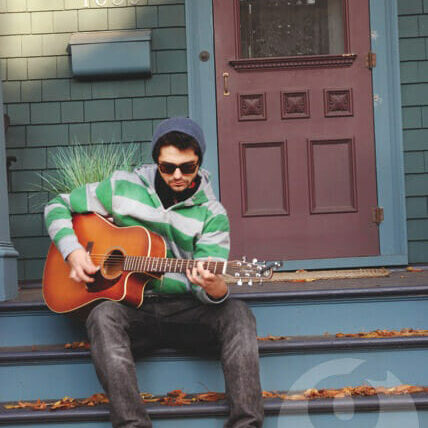
Dalhousie student takes on the Halifax music scene
Moe Kabbara sits on his single bed, strumming his mandolin. His acoustic guitar, and his ukulele—bright blue, with a red frog and green lily pads painted vividly on the body—lie next to him on the black sheets of his bed. It’s a new mandolin. He just bought it two days ago, and he’s excited to play it. Excited by the sound, and the glossy sheen of the lacquered wood.
Moe moved to Canada from Lebanon at the beginning of the school year, and while he came here to study, he has other ambitions in mind. He’s doing his master’s in environmental engineering, and although he enjoys it, he’ll be quick to tell you that a career in engineering isn’t his first choice.
What Moe really wants is to play music.
Moe started teaching himself guitar at 16, and says he has always been dedicated to learning, playing up to five hours a day when he started out. Now, four years later, he’s hoping to break into Halifax’s independent music scene.
He released his first EP, Understanding Imperfections, Three Songs, and You in Lebanon in September 2010. Moe says the five-track EP was a great start, but he’s looking for something more now that he’s in Canada. He says he wants a fresh start. “I don’t have expectations, but I have hopes,” he says.
The album ranges in sound from an instrumental track kicking it off, to the upbeat social commentary of “Ignorance is Bliss.” Moe writes and composes his own songs, influenced by singer-songwriters like Bon Iver and Damien Rice. He says The Shins, Iron and Wine, the Doors and the Beatles are some of his favourite bands.
Moe made his EP available on iTunes, as well as Amazon, and he’s also been trying to sell copies at TAZ Records here in Halifax. While he hasn’t played many shows since he’s come to Halifax—a gig at Rockbottom Brewery, and a few open mic nights—he’s hoping in time things will take off.
Moe started performing live about three years ago, when he had his first acoustic gig in a coffee shop in his hometown of Tripoli. With gained confidence, he then started playing frequently in Beirut, where he landed the recording offer.
While he had success in the underground indie music scene in Beirut, he says the scene was limited. Mainstream music in Lebanon is strictly in Arabic, music that Moe doesn’t prefer to listen to, let alone make. “It’s hard enough [not to be] into the mainstream Arabic music, so imagine playing non-mainstream English music in a Lebanese country,” he says. “A lot of people just aren’t into that stuff.”
With a limited scene came limited exposure. He played gigs at local cafés, or small festivals, but says it was a narrow audience, and was tough to break out of such a small circle. He started having financial success in Beirut—enough to live off of—and began thinking about expanding his career.
“I don’t want to make fortunes out of my music,” he says, but he maintains that he wants to be heard. He’s happy to tour around in pubs, and have small shows at local venues, so long as he can play. He says it’s not about the success or the money. It’s important that he writes for himself first.
“If I write a song and I’m really convinced and satisfied by it, that’s enough for me,” he says. “When someone else likes it, that’s an extra.” He says he’s still shocked when someone compliments his music, not because he’s insecure, but simply because it means a lot to him when he can reach out to people through his songs.
“When you lose that feeling, the satisfaction [a] compliment gives you, I think that’s when you lose your sense of being an artist.”
Moe is passionate about music—both his own music and the work of other artists. He enjoys watching clips and videos of other musicians’ inspiring performances. “Music is the only thing that provides that inner satisfaction that everyone is looking for,” he says.
As he picks up his guitar, switching instruments, and starts singing one of his more recent songs, you can tell he’s more than satisfied.







